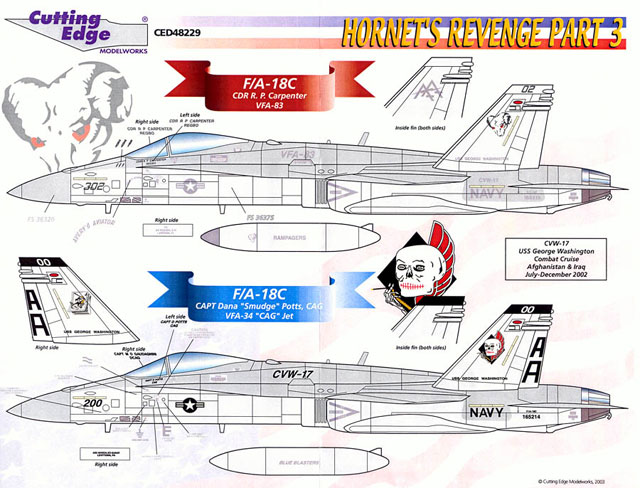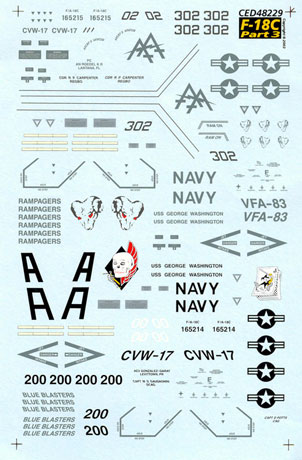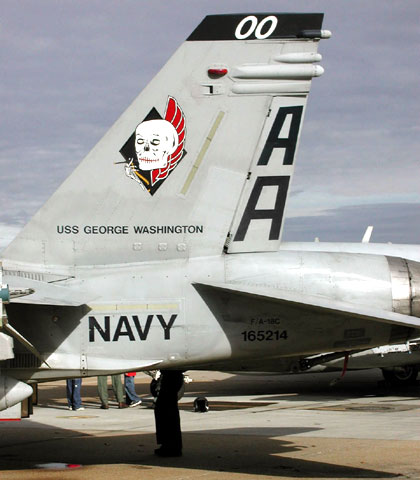|
S u m m a r y
|
| Catalogue
Number: |
CED48229 - Hornet's
Revenge Part Three |
| Scale: |
1/48 |
| Contents and Media: |
Double-sided full colour
letter-sized instructions plus notes sheet; 1 x full-size decal
sheet. |
| Price: |
USD$8.99 from
Meteor Productions website |
| Review Type: |
FirstLook |
| Advantages: |
Colourful options; sharp
printing; perfect register; well-detailed decal placement guide;
information sheet on the aircraft; single set of stencil data
included |
| Disadvantages: |
|
| Recommendation: |
Recommended |
Reviewed by Rodger Kelly

HyperScale is proudly sponsored by Meteor
Productions
Cutting Edge Modelworks
CED48229 is the final sheet in the Cutting Edge Decals Hornet’s
Revenge trilogy covering F/A-18s of the Atlantic Fleet. This
sheet features two further aircraft of CVW-17 that flew from the
flightdeck of the USS George Washington during the Afghanistan and
Iraq combat cruise between July and December of 2002.

The first aircraft is F/A-18C
Bureau number 165215, modex 302 belonging to VFA-83 “RAMPAGERS” and
assigned to Commander R P “Regbo” Carpenter. 307 features the
standard tactical paint scheme (TPS) worn by F/A-18s of FS 36320 dark
ghost grey over FS 36375 light ghost grey with a tan radome that has a
stainless steel tip.
At first glance 302 looks
pretty drab but she does have some rather unique markings for a
standard “line aircraft”. Firstly, she carries the name “Avery’s
Aviator” on both sides of her nose as well as a bomblog. She also
sports a little colour in that the eyes of the “RAMPAGERS” rams head
markings are red. The remainder of the markings are standard and they
include:
-
 A
set of lo-viz national insignia. A
set of lo-viz national insignia.
-
02 modex for the
fuselage sides (the swept back ones), tops of the flaps on the
wings, and abbreviated 02s for the outer sides of the fin caps. As
with the other two sheets in the Hornet’s Revenge series, there is a
further set of modex supplied but the placement guide does not
provide any clue as to where they should go.
-
AA airwing
identifiers for the vertical stabilizers
-
VFA-83 titles for
both sides of the spine.
-
Commander R P
“Regbo” Carpenter name for both side of the fuselage below the
windscreen.
-
The plane captain’s
name for the nose wheel door.
-
CVW-17 titles, NAVY
titles, USS Washington titles and the Bureau number block for the
rear fuselage.
-
“RAM ON” slogans and
pin striping for the wing fences.
-
“RAMPAGERS” titles
and VFA-83 zaps for either side of the drop tanks – you get six in
all.
The other aircraft is Bureau
number 165214 belonging to VFA-34 “BLUE BLASTERS” of CVW-17 aboard the
USS George Washington.
Finish is also the standard
Hornet TPS of FS 3620 dark ghost grey upper surfaces over FS 36375
light ghost grey, with a tan radome that has a stainless steel tip.
The placement guide shows that the fin caps are painted black.
 The majority of decals for
this aircraft are provided in black. They consist of: The majority of decals for
this aircraft are provided in black. They consist of:
-
CVW-10’s AA airwing
identifiers for the outer surfaces of the rudders.
-
200 modex for the
sides of the nose and tops of the flaps. The fin caps sport white
double zeros.
-
CVW-17 scripts for
the spine.
-
USS Washington
scripts for the base of the outer surfaces of the vertical
stabilizers.
-
CAG and DCAG names
beneath the canopy.
-
Bureau number data
block. National insignia, and Navy scripts.
-
BLUE BLASTERS
scripts for the drop tank.
Befitting a CAG aircraft, it
has some colour in its markings and these consist of:
§
The VFA-34 squadron insignia of a
smoking winged skull whose eyes and nose are cleverly depicted as and
old fashioned batsman for the outer surface of the port vertical
stabilizer.
§
A playing card Joker wielding a .50
Cal machine gun for the outer surface of the starboard vertical
stabilizer. This is the old WWII VF-20 "Jokers" squadron insignia from
which VFA-34 descended from.
The major stencil data is
supplied for each aircraft. Whilst there is not a great deal of on
the sheet is still a lot more than Cutting Edge normally supplies – to
be truthful, what they have supplied is probably enough to make your
model look busy and any more would probably be too much as it does
tend to merge into the background of the paint scheme on the 1-to-1
scale examples anyway and is not all that visible.
The decal placement guide
follows Cutting Edge’s normal fashion of a full colour double-sided
a-4 sized sheet. As with the two other Hornet’s Revenge sheets it
shows left hand side views of both aircraft on the front and a single
top and bottom generic view on the back. The side profiles show the
radomes of both aircraft to be grey. The same comments apply; I’m not
convinced that this is correct as the normal practice for F/A-18s is
that the extreme tip of the nose has a small stainless steel tip and a
tan coloured vinyl/rubber covering over the first third of the
radome.
There is no identification on
the decal sheet as to who printed it but my bet is that it was
Microscale such is the quality of the printing. The decal sheet and
placement guide come packed in a clear plastic zip-loc bag.
The recommended kits are the
Monogram F/A-18C and Hasegawa F/A-18C.
A nice sheet from Cutting Edge
that gives you alternative markings for the BLUE BLASTERS’ than
those
provided in the CAM Decals 48-113 sheet.
Recommended.
Thanks to
Cutting Edge Modelworks for
the review samples..
Cutting Edge Modelworks products,
including Cutting Edge Decals, can be viewed at
Meteor Productions website
Review Copyright © 2003 by
Rodger Kelly
Photographs Copyright © 2003 by David H. Klaus
This Page Created on 10 April, 2003
Last updated
14 August, 2003
Back to
HyperScale Main Page Back to Reviews Page |
Home | What's
New | Features
| Gallery |
Reviews | Reference
| Forum
| Search